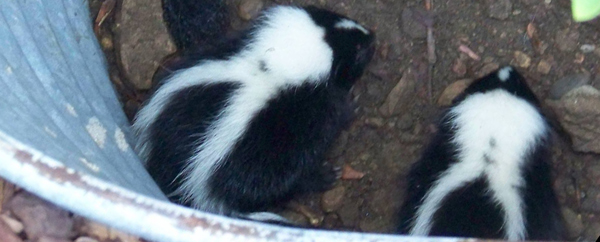- info@wildlife-removal.com
Call us for help in your town
Wildlife Removal Education
What is a skunk's natural diet?
Need skunk removal in your hometown? We service over 500 USA locations! Click here to hire us in your town and check prices - updated for year 2020.
What exactly do skunks like to eat and what constitutes their natural diet? How do they even search for food and do they have feeding habits?

These are likely to be some of the questions you earnestly long for their answers as a skunk keeper or intending keeper – or a disgruntled skunk-plagued home owner! Like most other big rodents, they exhibit common and peculiar feeding habits and diet systems.
Natural diets
One interesting fact to know about skunks is that they are omnivores – they feed on both plant and animal materials. Thus, they are opportunistic feeders, feeding on anything that is available per time.
During fall and winter, they eat both plant and animals in equal quantities but during spring and summer, they feed more on animal materials, which are more available. Their preferred food is insects; the grasshoppers, bees, ants, wasps, crickets, beetles, beetle larvae and honeybee and so on.
Asides insects, other important components of the skunk diet are earthworms, grubs, cottontail, rabbit, small rodents, lizards, salamanders, caterpillars, millipedes, slugs, frogs, small snakes, birds, moles and eggs.
Plant materials that skunks eat include berries, cherries, blackberries, blueberries, carrion, roots, leaves, grasses, fungi, nuts and garden crops.
They possess large, strong feet with well-developed and sharp claws which enhances their digging mode of feeding. On rare occasions, skunks may also scavenge on bird and rodent carcasses left by cats or other bigger animals.
If you do or intend to care for a skunk, it is best to feed it with low fat foods and less protein content as these foods can make a skunk become morbidly fat. High protein and high fat diet will also make them slack and lazy which could result in poor health or worse still, death.
How the skunk finds its food
Skunks like other large rodents forage around for food and they are primarily nocturnal so they hunt at night. They are attracted to grubs that they can smell through the ground. When this happens, they dig a hole through the soil to get at the grubs.
Skunks also raid the foods stored by other rodents such as the weasel, but skunks do not store food. Apart from being nocturnal, skunks are also non-gregarious. Thus, a skunk will most likely hunt for food its food alone.
Go back to the Skunk Removal page, or learn tips by reading How to get rid of skunks.


















